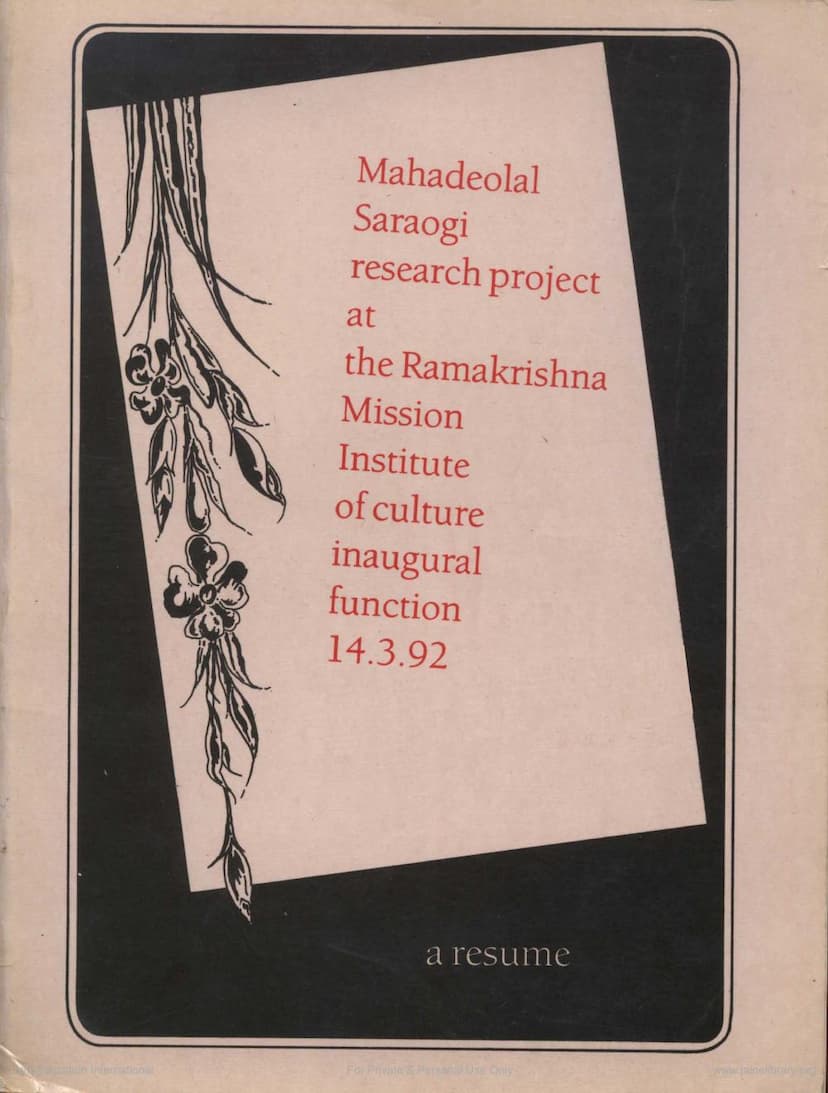Keynote Address Of Dr Sagarmal Jain At Calcutta
Added to library: September 2, 2025

Summary
This document is a compilation of materials related to the inauguration of the Mahadeolal Saraogi Research Project on Jainism at the Ramakrishna Mission Institute of Culture in Calcutta on March 14, 1992.
Here's a comprehensive summary:
1. The Occasion and Purpose:
- The event marked the inauguration of a new research wing focused on Jainism, sponsored by the Mahadeolal Saraogi Endowment.
- This project was a fulfillment of the aspirations of Mahadeolal Saraogi, a prominent Calcutta trader who renounced the world at age 50 to pursue Jain teachings.
- The goal was to rejuvenate the study of Jainism and present its view of life and values in proper perspective.
- The project was initiated in collaboration with Swami Lokeswaranandaji Maharaj of the Ramakrishna Mission Institute of Culture, who was expanding the institute's research activities.
2. Mahadeolal Saraogi: A Profile:
- Born in 1893 and passed away in 1953, Mahadeolal Saraogi was a devout Jain and a successful businessman.
- He renounced worldly life at 50, following the teachings of Jain Acharya Sri Tulsi.
- He believed Jain tenets were relevant to modern life and worked to spread knowledge of Jain principles both in India and abroad.
- His legacy of dedication to Jainism and community service continued through his descendants, who were active in social and political spheres and established "Seva Pratisthans" (service institutions).
- The Saraogi family also created an endowment for an annual award for eminent social workers, transcending religious and political differences.
- Mahadeolal Saraogi embodied the ideal of Trusteeship, believing wealth should be used for the service of the community.
3. Keynote Address by Prof. Sagarmal Jain: The keynote address, delivered by Prof. Sagarmal Jain, Director of P.V. Research Institute, Varanasi, formed the core of the booklet. Its main themes include:
- The Interconnectedness of Indian Culture: Prof. Jain argued that studying Jainism (along with Buddhism) is crucial for a comprehensive understanding of Indian culture as a whole. He emphasized that these traditions are not isolated but deeply intermingled and mutually influenced, making "water-tight compartments" unfeasible.
- Brahmanic and Sramanic Traditions: He discussed the two major trends in Indian culture: Brahmanic and Sramanic. While distinguishable, they are inseparable and have influenced each other. Jainism and Buddhism, as later Sramanic traditions, were influenced by Vedic traditions, and in turn, introduced concepts like austerity, asceticism, liberation, meditation, equanimity, and non-violence into Hinduism.
- Reform, Not Revolt: Contrary to some Western scholarship, Prof. Jain presented Jainism and Buddhism not as a revolt against Brahmanism but as a "reformer's crusade" against the ritualism, casteism, and superstitions that had accumulated in Vedic traditions. He stressed that these were reformative movements within the broader Indian cultural stream.
- Reciprocal Influence: He highlighted how Hinduism accepted figures like Rishabha and Buddha as incarnations, while Jainism included Rama and Krishna as Salaka Purusas. Jainism also adopted Hindu deities as consorts of Tirthankaras, demonstrating a reciprocal influence.
- The Need for Inter-Religious Studies: He advocated for research into this mutual impact to bridge the perceived gulfs between different religious systems, aligning with the spirit of Sri Ramakrishna and Swami Vivekananda.
- Relevance of Jainism in the Present Era:
- Addressing Modern Crises: Prof. Jain identified the core problems of the modern age as mental tensions, violence, and conflicts of ideologies and faiths. He argued that scientific advancement has not necessarily led to spiritual growth or peace.
- The Need for Inner Peace: He emphasized that true peace is an inner state of tranquility, and external peace is a consequence of individual inner peace. Jainism's core teaching is the realization of one's essential nature, which is tranquility.
- Causes of Mental Tension: Jainism posits that attachment to worldly objects is the root cause of suffering and mental tensions.
- Non-Violence (Ahimsa): This is the central tenet of Jain ethics. It's not just about not killing but encompasses a broader spectrum of virtues like peace, harmony, and fearlessness. While complete non-violence is an ideal, "lesser killing is better living" should be the motto. Non-violence also has a positive aspect: service to the needy.
- Non-Absolutism (Anekantavada): This doctrine emphasizes that reality is complex and can be viewed from multiple perspectives. No single viewpoint holds the absolute truth. Anekantavada promotes intellectual and social tolerance, preventing dogmatism and one-sidedness. It encourages respecting others' ideologies and faiths as they offer partial but valid insights into reality.
- Non-Attachment (Aparigraha): This principle is presented as the solution to economic inequality, greed, and exploitation. It involves controlling desires and limiting possessions.
- The Guiding Principles for a Harmonious Society: Prof. Jain concluded by reiterating that Jainism's core tenets of non-attachment, non-violence, and non-absolutism offer a path to peace and harmony in the world. He quoted Acharya Amitagati's verse emphasizing friendliness to all, joy in virtue, compassion for the suffering, and neutrality towards opponents.
4. Endorsements and Acknowledgments:
- The booklet includes quotes from various spiritual leaders like the Bhagavad Gita, Guru Nanak, Sri Ramakrishna, Swami Vivekananda, and Mahatma Gandhi, setting a philosophical tone.
- Gobindlal Saraogi, likely a descendant, wrote the prologue, highlighting the significance of the project and Mahadeolal Saraogi's legacy.
- Prof. Dhiresh Bhattacharya offered the vote of thanks, emphasizing the project's role in uncovering India's socio-cultural heritage and contributing to national reconciliation.
- The booklet also includes the keynote address in Hindi.
In essence, the document is a commemoration of Mahadeolal Saraogi's enduring legacy and the establishment of a research initiative dedicated to understanding and promoting the profound philosophical and ethical contributions of Jainism to Indian culture and global peace. It advocates for a unified, tolerant, and value-centric approach to inter-religious and cultural understanding.